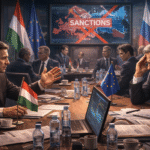China has signaled a partial reversal of its export restrictions on semiconductors produced by Nexperia, the Dutch chipmaker at the center of an international dispute, as fears grow that prolonged shortages could disrupt global car production.
A Step Toward De-escalation
Beijing’s commerce ministry announced that it would allow some Nexperia chips to be shipped abroad, citing concerns over the stability of international supply chains. The ministry invited affected companies to contact officials directly and said exemptions would be granted “based on actual circumstances,” emphasizing the need to maintain “the security and stability of domestic and international supply chains.”
The move comes amid easing tensions between China and the United States, following a one-year truce reached by Presidents Xi Jinping and Donald Trump during a summit in South Korea. As part of the deal, China agreed to suspend broad export controls on rare earth minerals, while Washington halted plans to extend technology export bans to subsidiaries of blacklisted Chinese firms.
The announcement also coincided with talks in Brussels between Chinese and EU officials focused on export controls, including the Nexperia case and broader supply chain issues.
Background: A Global Supply Chain Disruption
Nexperia, a key supplier of semiconductors for the automotive industry, became the focal point of geopolitical tension after the Dutch government seized control of the company in October, citing “serious governance shortcomings” related to its Chinese ownership.
The Netherlands-based firm was acquired in 2017 by China’s Wingtech, which itself was added to the U.S. Commerce Department’s export blacklist last year. The Dutch intervention effectively split Nexperia’s European headquarters from its Chinese manufacturing operations, prompting Beijing to retaliate by blocking exports of Nexperia’s finished products — 80 percent of which are processed in China.
The result was a severe shortage of key automotive chips used in components such as airbags and lighting systems. Honda, Volkswagen, and Ford have already reported production slowdowns due to depleted chip inventories. Ford CEO Jim Farley said Washington was working to mediate the dispute, while Volkswagen warned its chip supply could run out within days.
Dutch and Chinese Positions
A Dutch government spokesperson said The Hague remains in “close contact” with Chinese officials and international partners to restore balance to the semiconductor supply chain and reach a “constructive solution beneficial to both economies.”
China, however, has sharply criticized the Netherlands’ intervention, accusing it of “inappropriate interference” in a private company’s operations and blaming the action for “chaos in the global supply chain.”
Governance Concerns and Corporate Fallout
The governance crisis at Nexperia was triggered by actions taken by Wingtech’s controlling shareholder, Zhang Xuezheng, who sought to build a new semiconductor plant in Shanghai outside the formal oversight of both Nexperia and Wingtech. Dutch authorities found that Zhang had compelled Nexperia to place large, unnecessary orders from the new factory — a move that raised red flags about internal control and corporate independence.
Following the Dutch government’s seizure of Nexperia’s management, Zhang was removed as chief executive. Wingtech later told the Financial Times it viewed the intervention as “an attempt to pave the way for a Dutch takeover” and warned that Nexperia faced an “existential threat,” with hundreds of global jobs at risk.
Industry Reaction and Outlook
A senior European automotive executive called Beijing’s decision “a positive and significant development,” though cautioned that “implementation details remain unclear” and disruptions could persist for weeks.
Nexperia’s complex global footprint — with wafers produced in Germany and the UK, assembled in China, and distributed worldwide — underscores the interdependence of global manufacturing. The easing of export restrictions may relieve immediate pressure, but it also highlights the fragility of supply chains amid deepening political tensions between China, Europe, and the United States.








